Understanding Why Customer Retention Outweighs Churn for Sustainable Growth
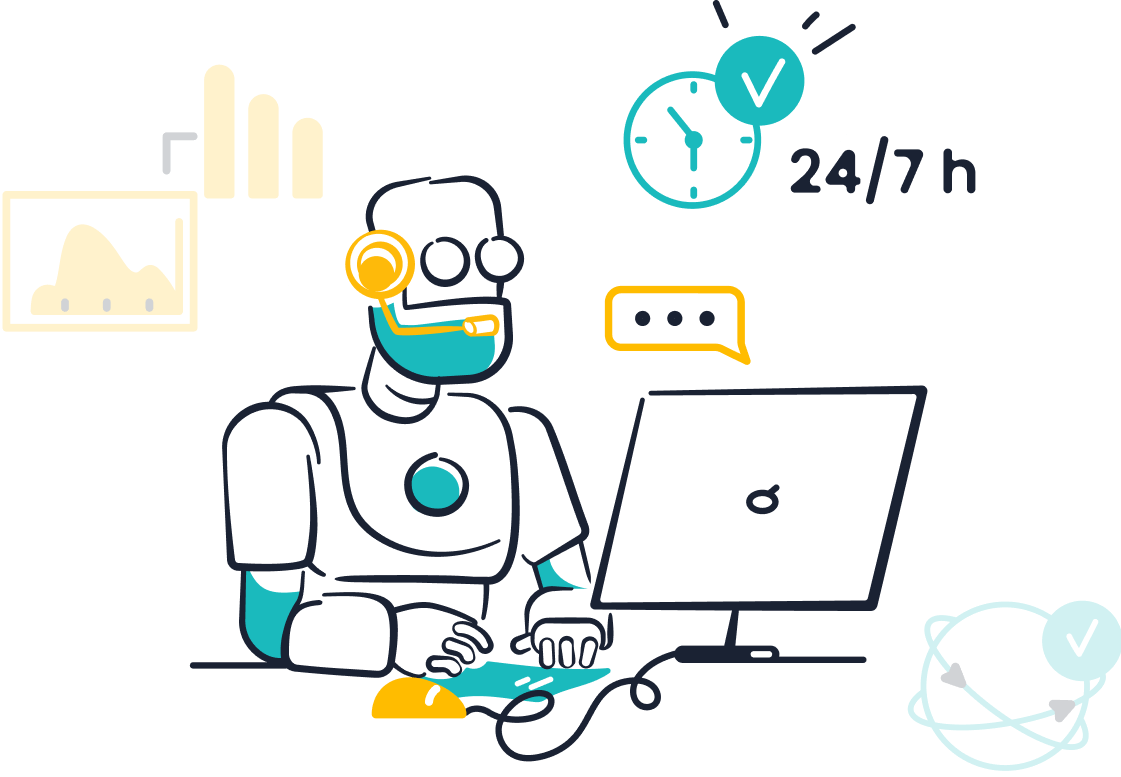
Customer retention stands at the heart of sustainable growth. When you focus on keeping your existing customers happy, you unlock more value and loyalty than simply trying to reduce churn. Let’s look at the numbers:
| Statistic Description | Numerical Value / Impact |
|---|---|
| Increase in profits from a 5% increase in retention rates | 25% to 95% increase in profits |
| Cost difference between acquiring new vs retaining customer | 5 to 25 times more expensive to acquire |
Loyal customers bring repeat business and drive long-term loyalty. They are 50% more likely to try new products and can have a value up to 10 times greater than their first purchase. This is why understanding customer retention vs churn is key for business success. Sobot helps you build strong customer relationships, boost loyalty, and improve retention, ensuring your business success goes beyond just reducing churn.
Customer Retention vs Churn
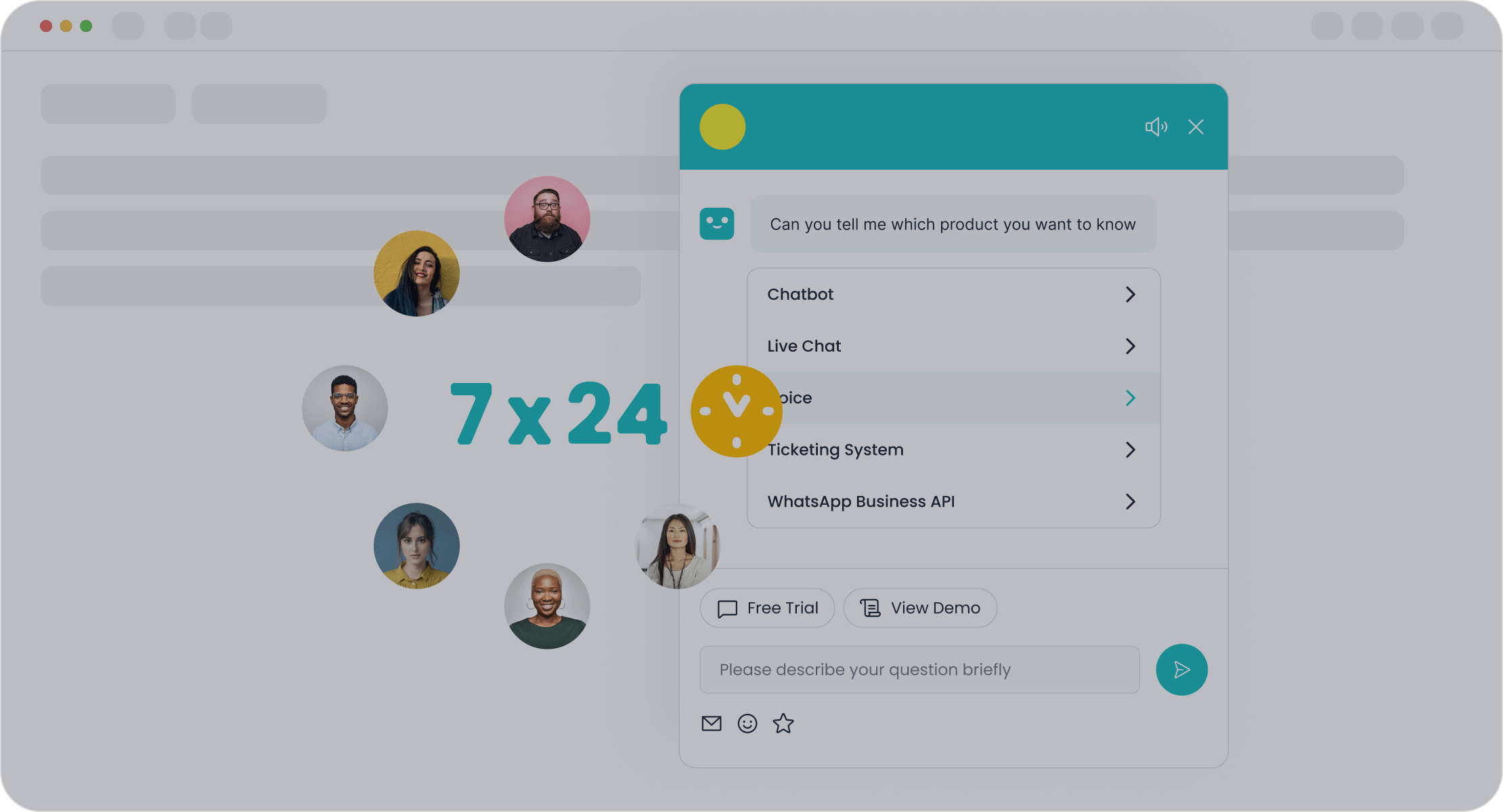
Customer Retention Defined
Let’s start with the basics. Customer retention means you keep your customers coming back to your business. When you focus on customer retention, you build loyalty and trust. This leads to more repeat purchases and higher customer lifetime value. You want your customers to stay with you, not leave for a competitor.
You can measure customer retention with a simple formula:
For example, if you start with 500 customers, gain 30 new ones, and end with 480, your customer retention rate is ((480 - 30) / 500) x 100 = 90%. That’s a strong sign your customers like what you offer.
Companies like Sobot help you improve customer retention by making every interaction smooth and personal. When you use tools like Sobot’s AI Chatbot, you answer questions quickly and keep customers happy. Happy customers stick around, and that’s what customer retention is all about.
Churn Rate Explained
Churn rate tells you how many customers leave your business over a certain period. If your churn rate is high, you lose customers fast. If it’s low, most customers stay. Churn rate is the opposite of customer retention rate. You want to keep churn low and retention high.
Here’s how you calculate churn rate:
- Churn Rate = (Customers Lost During Period / Total Customers at Start of Period) x 100
Let’s say you start with 1,000 customers and lose 50 in a month. Your churn rate is (50 / 1,000) x 100 = 5%. That means 5% of your customers left that month.
Churn rate can also be measured by revenue, not just customer count. This is helpful if some customers spend more than others. Many businesses track both customer churn rate and revenue churn rate for a full picture.
| Formula Type | Formula Description | Example Calculation | Context / Use Case |
|---|---|---|---|
| Average Number of Users | (Number of Churned Users / Average Number of Users) * 100 | (200 / ((1000+1100)/2)) * 100 = 19.05% | Fluctuating user base |
| Number of Users at Start of Year | 1 - (Number of Users at End of Year / Number of Users at Start of Year) * 100 | 1 - (1100 / 1000) * 100 = -10% (growth) | Year-over-year comparison |
| Revenue Lost from Churned Customers / Total Revenue at Start of Year * 100 | (180,000 / 1,000,000) * 100 = 18% | Revenue churn ($) | |
| Monthly Recurring Revenue (MRR) Lost to Churn / MRR at Start of Year * 100 | (15,000 / 100,000) * 100 = 15% | Subscription businesses |
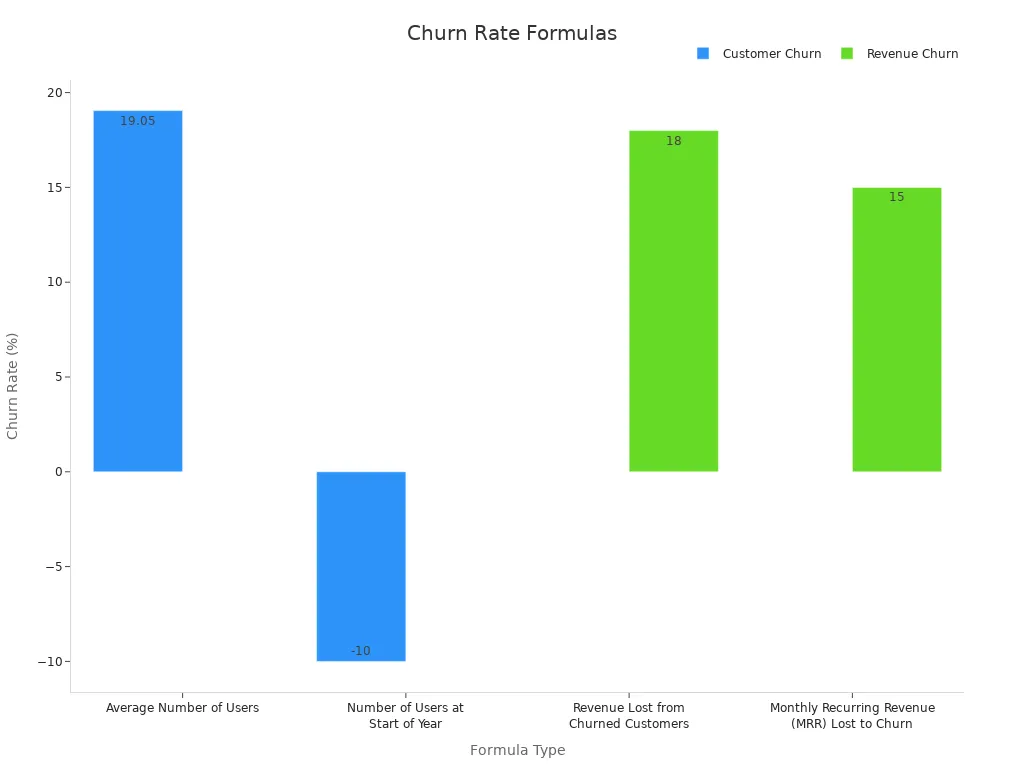
Churn rate benchmarks change by industry. For example, SaaS companies aim for an annual churn rate of 5-10%. Retail and ecommerce often see higher churn rates. Tracking churn rate helps you spot problems early and take action.
Customer Retention Rate
Customer retention rate shows the percentage of customers you keep over time. It’s a key metric for growth. A high customer retention rate means your customers are happy and loyal. A low rate means you need to improve your service or products.
Here’s the formula again:
- Customer Retention Rate = ((Customers at End of Period – New Customers) / Customers at Start of Period) x 100
Let’s look at an example. You start with 500 customers, gain 80 new ones, and end with 530. Your customer retention rate is ((530 - 80) / 500) x 100 = 90%. This means you kept 90% of your original customers.
Why does this matter? Studies show that increasing customer retention by just 5% can boost profits by 25% to 95%. Loyal customers cost less to keep and spend more over time. They also tell others about your business, bringing in new customers.
Tip: Companies like Sobot help you track customer retention rate and customer churn rate in real time. With Sobot’s unified dashboard, you see where you stand and spot trends fast.
Why Understanding Both Metrics Matters
You need to know both customer retention vs churn to grow your business. If you only look at churn rate, you might miss why customers leave. If you only focus on retention, you might not see warning signs. Both metrics work together.
- About 67% of customer churn can be stopped if you solve issues at first contact (HuffPost).
- Poor customer service causes 14% of churn (Retently).
- The average customer retention rate across industries is 75% (Exploding Topics).
- Companies with strong omnichannel engagement, like those using Sobot, keep 89% of customers. Weak strategies only keep 33% (Forbes).
When you understand customer retention vs churn, you can:
- Find out why customers leave.
- Improve your service to keep more customers.
- Increase profits and grow faster.
A study in Denmark and the USA showed that churn analysis helps you spot why customers leave, but real growth comes from customer retention strategies. These strategies focus on making customers happy, offering better service, and building loyalty. Every market is different, so you need to tailor your approach.
Sobot’s tools help you do just that. With features like AI chatbots, omnichannel support, and real-time analytics, you can boost customer retention, lower churn rate, and build a loyal customer base.
Financial Impact of Customer Retention
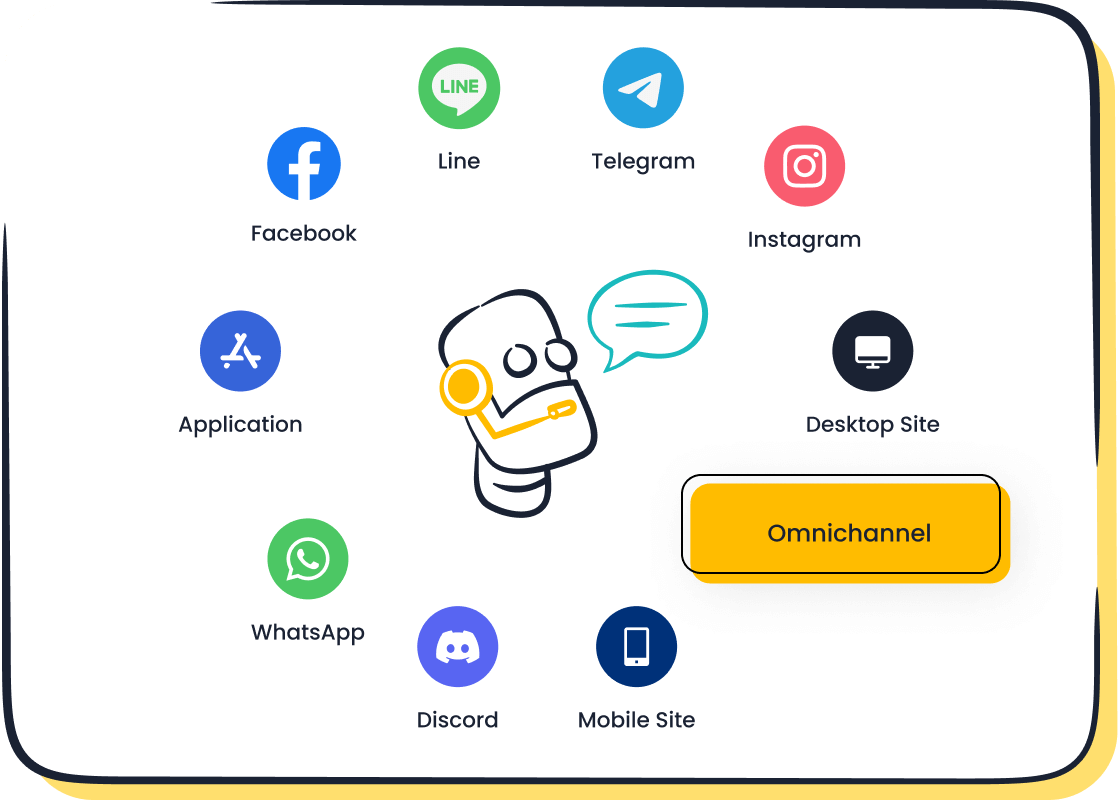
Cost of Retention vs Acquisition
You might think getting new customers is the best way to grow. The truth is, keeping your current customers is much smarter for your wallet. The cost of acquiring a new customer is about five times higher than keeping an existing one. Why? You spend a lot on ads, promotions, and sales to attract new faces. Retention, on the other hand, focuses on building relationships and trust. Sending a thank-you email or offering a loyalty reward costs much less. For example, if you spend $750 to get a new customer, you might only spend $160 to keep one. That’s a huge difference! Sobot’s tools help you automate follow-ups and reward programs, making customer retention even more affordable.
Revenue Stability
Customer retention gives your business steady income. Loyal customers come back again and again, creating a reliable cash flow. You can plan better and worry less about sudden drops in sales. Here’s what happens when you focus on retention:
- Loyal customers make repeat purchases, which means steady revenue.
- Retention reduces the need to constantly find new customers.
- High retention leads to higher Net Revenue Retention (NRR), showing your revenue is stable and growing.
- Loyal customers often pay faster, which helps your cash flow.
Companies with strong customer loyalty can even charge premium prices. They also get more referrals, which brings in new customers at a lower cost. Sobot’s unified dashboard lets you track these trends, so you always know where you stand.
Customer Lifetime Value
Customer lifetime value (CLV) tells you how much money a customer brings to your business over time. When you boost retention, you raise CLV. Loyal customers spend more, buy more often, and try new products. For example, a German bank saw a 105% jump in credit card sales after personalizing offers for loyal customers. Programs like Starbucks Rewards show how rewarding loyalty increases CLV. Sobot’s marketing solution helps you send the right message at the right time, turning one-time buyers into lifelong fans. When you understand CLV, you can invest in the right places and grow your business for the long haul. That’s the real financial impact of loyalty.
Reducing Customer Churn Rate
Identifying Churn Causes
You can’t fix what you don’t understand. To reduce churn, you first need to know why customers leave. In contact centers and ecommerce, common reasons for customer churn include unclear messaging, confusing navigation, and poor customer experience. Sometimes, pricing issues or slow support push customers away. You can spot these problems by collecting and analyzing customer behavior data. For example, mapping the customer journey helps you see where customers get stuck or frustrated. Early detection of at-risk customers lets you act before they churn. Tracking key metrics like customer churn rate, customer satisfaction, and Net Promoter Score (NPS) gives you a clear picture of what’s working and what’s not. When you use analytics and feedback, you can pinpoint the root causes of churn and take action fast.
| Step/Metric | Description |
|---|---|
| Define churn rate | Calculate the percentage of customers lost in a period |
| Identify churned customers | Find out which customers stopped using your service |
| Analyze behavior and feedback | Look for patterns and reasons behind customer churn |
| Pinpoint root causes | Use data to spot issues like poor service or product problems |
| Metrics used | Churn rate, customer satisfaction, NPS, customer lifetime value, retention |
Improving Customer Experience
If you want to lower your churn rate, focus on customer experience. Research shows that 80% of customers switch brands because of poor experience (Qualtrics). Simple steps like improving onboarding, offering fast support, and making interactions easy can boost customer satisfaction. When you track customer satisfaction scores, customer effort scores, and NPS, you see how happy your customers are. High scores mean you’re doing things right. Low scores warn you about possible churn. Companies that invest in customer experience see a direct drop in customer churn rate and a rise in loyalty. Even small changes, like clear communication or a helpful chatbot, can make a big difference in reducing churn and increasing satisfaction.
Tip: A 5% increase in retention can boost profits by up to 95%. That’s the impact of reducing churn through better customer experience.
Sobot Chatbot for Churn Reduction
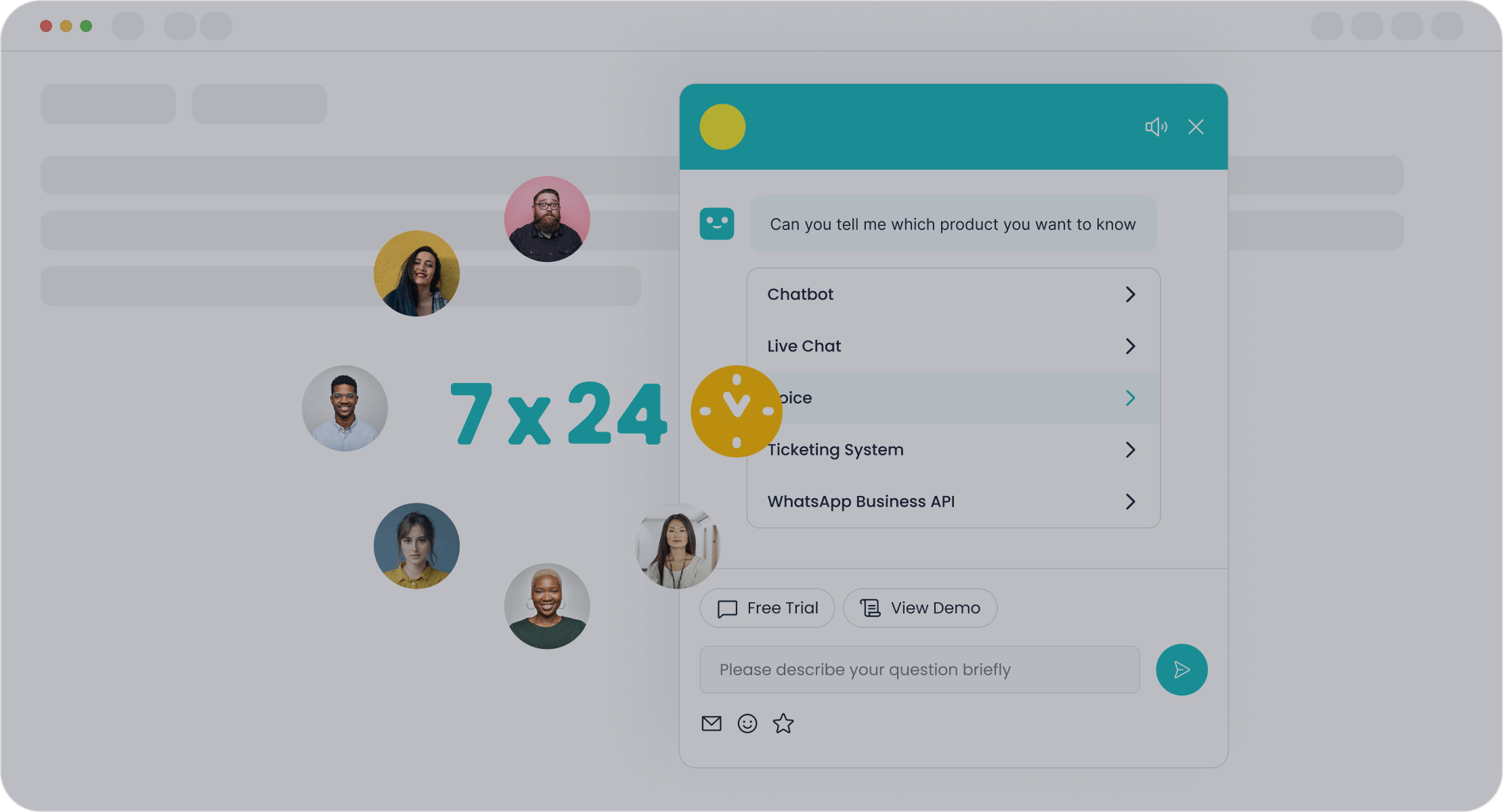
Sobot’s AI-powered chatbot helps you reduce churn by giving customers instant, accurate support 24/7. When customers get quick answers, their satisfaction goes up and their chances of leaving drop. Brands like Opay and Michael Kors use Sobot’s omnichannel solutions to keep customers happy across every touchpoint. The chatbot personalizes communication, routes customers to the right agent, and even manages bookings automatically. This proactive support means fewer missed issues and higher customer satisfaction. Sobot’s tools also let you track customer churn rate and satisfaction in real time, so you can spot trends and act fast. With Sobot, you make every customer feel valued, which is the best way to reduce churn and build loyalty.
Strategies to Boost Customer Retention Rate
Personalization and Loyalty
You want your customers to feel special. Personalization and loyalty programs help you do that. When you tailor offers and messages to each customer, you show you care about their needs. This builds trust and loyalty. Most customers love it when you remember their preferences or give them exclusive rewards. Here are some facts:
- 80% of consumers are more likely to buy from companies that offer personalized experiences (Epsilon).
- 90% of loyalty program owners see positive returns, averaging 4.8 times their investment.
- 73% of people change their spending to get more loyalty benefits.
- Loyal customers are 64% more likely to buy more often and 31% more willing to pay higher prices.
A strong customer retention strategy uses loyalty programs and personalized experiences to keep customers coming back. Sobot helps you deliver these experiences with tools that track preferences and automate rewards. When you focus on customer loyalty, you boost customer retention and drive long-term success.
Proactive Support with Sobot
Proactive support means you help customers before they even ask. This makes them feel valued and increases customer retention. Companies that use proactive support see a 15-20% jump in retention. You can send reminders, offer help during checkout, or answer questions instantly. Sobot’s AI-powered chatbot gives your customers 24/7 support, so they never feel ignored. The chatbot uses real-time data to spot problems early and reach out with solutions. Businesses using AI for customer engagement have seen a 20% rise in satisfaction and a 10% increase in retention. When you use Sobot, you make customer success a priority and show customers you care about their loyalty and happiness.
Marketing Solutions for Retention
You can’t grow without keeping your best customers. Sobot’s marketing solution helps you create campaigns that target the right people at the right time. You can send personalized offers, run loyalty programs, and re-engage customers who haven’t bought in a while. The platform lets you track every interaction, so you know what works. Companies using omnichannel personalized experiences see better loyalty and retention. Sobot’s marketing tools help you maximize customer retention by making every message count. You can boost customer loyalty, increase customer retention, and turn happy customers into brand advocates. With Sobot, you have everything you need for customer success and long-term retention.
Measuring Success
Key Metrics to Track
You want to know if your customer success strategies work. The best way is to track the right metrics. Here are some you should watch:
- Customer Retention Rate (CRR): Shows how many customers stick with you over time. A high CRR means your customer success efforts pay off.
- Customer Churn Rate: Tells you how many customers leave. Lower churn means higher satisfaction.
- Customer Lifetime Value (CLV): Measures how much revenue you get from each customer during their time with you.
- Net Promoter Score (NPS): Asks customers how likely they are to recommend you. High NPS means strong loyalty and customer success.
- Customer Satisfaction Score (CSAT): Lets you measure customer satisfaction after every interaction.
- Monthly Recurring Revenue (MRR): Tracks steady income from repeat customers.
- Customer Health Score: Combines different signals to predict if a customer will stay or leave.
These metrics help you see what works, spot problems, and improve customer satisfaction.
| Metric Name | What It Shows | Why It Matters |
|---|---|---|
| Customer Retention Rate | % of customers you keep | Shows loyalty and customer success |
| Customer Churn Rate | % of customers you lose | Reveals loss trends |
| Customer Lifetime Value | Total revenue per customer | Guides investments |
| Net Promoter Score | Loyalty and word-of-mouth | Predicts growth and satisfaction |
| Customer Satisfaction | How happy customers are | Direct way to measure customer success |
Using NPS and Feedback
NPS and feedback give you a clear view of customer satisfaction. When you measure customer satisfaction with NPS, you find out who loves your brand and who needs more help. High NPS scores mean your customer success team does a great job. If you act fast on feedback, you can turn unhappy customers into loyal fans. Always ask for feedback after key moments. Use what you learn to improve your service. This keeps satisfaction high and churn low. Companies that use NPS and feedback see better customer success and stronger loyalty.
Tip: Track NPS and feedback over time. This helps you spot trends and fix issues before they hurt customer satisfaction.
Real-World Results: OPPO and Sobot
Let’s look at OPPO, a global smart device brand. OPPO used Sobot’s solutions to boost customer success. They reached a 93% customer satisfaction score and saw a 57% jump in repeat purchases. Sobot’s chatbot helped OPPO answer questions fast and keep customers happy. The result? Higher satisfaction, more loyal customers, and real business growth. This shows how the right tools can measure customer satisfaction and drive customer success.
You see the real power of retention when you focus on making every customer experience better. Companies like Amazon and Spotify show that strong retention strategies—like easy checkouts and personalized playlists—lead to higher loyalty and lower churn.
- Adobe found that every $1 spent on user experience can return $100.
- Apple and Dropbox keep churn low by building seamless, user-friendly systems.
Sobot helps you do the same. Start tracking retention and churn today. Make every interaction count for long-term growth.
FAQ
What is the difference between customer retention and customer churn rate?
Customer retention shows how many customers stay with you. Customer churn rate tells you how many leave. You want a high customer retention rate and a low customer churn rate. Both metrics help you measure customer success and customer satisfaction.
How can Sobot help improve my customer retention rate?
Sobot gives you tools like AI chatbots and marketing solutions. These tools automate support, personalize messages, and track customer satisfaction. OPPO used Sobot and saw a 57% increase in repeat purchases. You can read more about their story here.
Why does customer satisfaction matter for customer retention?
Happy customers stick around. Research shows 80% of customers leave after a bad experience (Qualtrics). High customer satisfaction leads to a higher customer retention rate and better customer success.
What are some easy ways to boost customer retention?
Try these tips:
- Personalize your messages.
- Offer loyalty rewards.
- Use Sobot’s chatbot for fast support.
- Ask for feedback. These steps help you increase customer retention and customer satisfaction.
How do I measure customer success with Sobot?
You can track key metrics like customer retention rate, customer churn rate, and NPS in Sobot’s dashboard. This helps you spot trends, improve customer satisfaction, and grow your business with real data.
See Also
Expert Strategies For Live Chat Success In Retail
Ways Chatbots Enhance Customer Happiness In Online Shopping
Achieving Excellence With Live Chat In Customer Service
